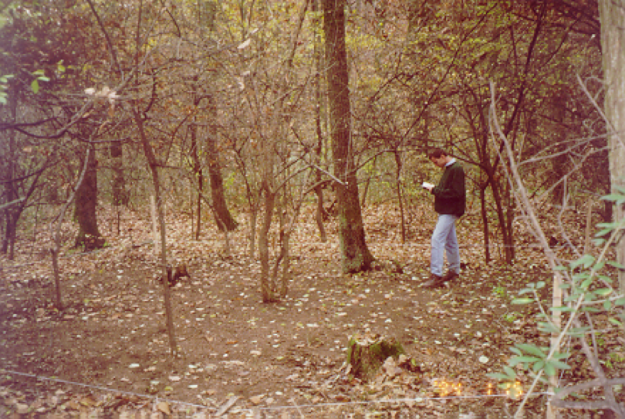Síkfőkút Experimental Forest (Síkfőkút, Hungary)
 The Síkfőkút Experimental Forest (SIK) is located in northeastern Hungary. The project area (27 ha) is located in the southern part of the Bükk Mountains at an average altitude of 325 m (47°55’38”N, 20°26’43”E). Elevation ranges from about 320m to 340m. Síkfőkút has a temperately continental climate with hot summers with low overall humidity levels but frequent rain showers and mildly cold snowy winters. Temperature is -1°C (January) to 22°C (July). The mean annual temperature is 10°C and mean annual precipitation is 553 mm. Long-term meteorological data indicate that the climate at the site has become drier and warmer over the past four decades in Síkfőkút.
The Síkfőkút Experimental Forest (SIK) is located in northeastern Hungary. The project area (27 ha) is located in the southern part of the Bükk Mountains at an average altitude of 325 m (47°55’38”N, 20°26’43”E). Elevation ranges from about 320m to 340m. Síkfőkút has a temperately continental climate with hot summers with low overall humidity levels but frequent rain showers and mildly cold snowy winters. Temperature is -1°C (January) to 22°C (July). The mean annual temperature is 10°C and mean annual precipitation is 553 mm. Long-term meteorological data indicate that the climate at the site has become drier and warmer over the past four decades in Síkfőkút.
Vegetation is a typical Quercetum petraeae-cerris forest. Dominant hardwood species are Sessile oak, Turkey oak. Species composition and the structure of the Síkfőkút forest has changed significantly since the early 1970’s: 68.4% of Sessile oak (Quercus petraea) and 15.8% of Turkey oak (Quercus cerris) died, and field maple (Acer campestre) has increased in density from 0 to 131 per ha. Soil is clayey Cambisol (Brown forest soil with clay illuviation).
DIRT plots were established in 2000.
Unique Research:
Detrital inputs quantity and quality versus climate change: The overall objective of the DIRT project is to explore how changes in the quality and quantity of detritus inputs affect soil organic matter composition and content. The general purpose of the project is to reveal the connection between modifications of detritus production and changes of climatic conditions and land use. It also studies how the modifications, decreases or increases in detritus production influence organic material content, and physical, chemical or biological processes of soils. The six DIRT treatments create various ecological conditions in soil; we can simulate a certain part of the effects caused by climate and further anthropogenic changes in land use and cultivation, such as deforestation or reforestation of plough-lands. Furthermore our purpose was to discover whether different detritus inputs would influence the moisture and temperature sensitivity of soil biological processes.
Chemistry of Leaf Litter and Soil Enzymes: Decomposition rates of leaf-litter, as compared to soil humidity and temperature, affect enzyme activity and types of enzymes (dehydrogenase, phenoloxydase, phosphatase, ß-glucosidase, arylsulfatase, sacharase, protease, cellulase).
Key contacts: Istvan Fekete (feketeistani at gmail.com), Zsolt Kotroczo (kotroczo.zsolt at gmail.com)
Key publications:
Fekete, I., C. Varga, B. Biró, J. A. Tóth, G. Várbíró, K. Lajtha, G. Szabó, and Z. Kotroczó. 2016. The effects of litter production and litter depth on soil microclimate in a central european deciduous forest. Plant and Soil 398:291-300.
Veres, Z., Z. Kotroczó, I. Fekete, J. A. Tóth, K. Lajtha, K. Townsend, and B. Tóthmérész. 2015. Soil extracellular enzyme activities are sensitive indicators of detrital inputs and carbon availability. Applied Soil Ecology 92:18-23.
Beni, A., E. Soki, K. Lajtha, and I. Fekete. 2014. An optimised HPLC method for soil fungal biomass determination and its application to a detritus manipulation study. Journal of Microbial Methods, 103:124–130.
Kotroczó, Z., Z. Veres, I. Fekete, Z. Krakomperger, J. A. Tóth, K. Lajtha, and B. Tóthmérész. 2014. Soil enzyme activity in response to long-term organic matter manipulation. Soil Biology and Biochemistry 70:237-243.
Fekete, I., Z. Kotroczó, C. Varga, R. Hargitai, K. Townsend, G. Csányi, and G. Várbiró. 2012. Variability of Organic Matter Inputs Affects Soil Moisture and Soil Biological Parameters in a European Detritus Manipulation Experiment. Ecosystems 15:792-803.
Tóth, J. A., P. T. Nagy, Z. Krakomperger, Z. Veres, Z. Kotroczó, S. Kincses, I. Fekete, M. Papp, and K. Lajtha. 2011. Effect of Litter Fall on Soil Nutrient Content and pH, and its Consequences in View of Climate Change (Síkfőkút DIRT Project). Acta Silv. Lign. Hung. 7 75-86.
Fekete, I., Cs. Varga, Zs. Kotroczó, J. A. Tóth, G. Várbiró. 2011. The relation between various detritus inputs and soil enzyme activities in a Central European deciduous forest. Geoderma 167-168: 15-21.
Fekete I, Zs. Kotroczó, Cs. Varga, Zs. Veres, J. A. Tóth. (2011): The effects of detritus inputs on soil organic matter content and carbon-dioxide emission in a Central European deciduous forest. Acta Silvatica et Lignaria Hungarica 7: 87-96.
Kotroczó, Zs., G. Koncz, J. L. Halász, I. Fekete, Zs. Krakomperger, M. D. Tóth, S. Balázsy, J. A. Tóth. 2009. Litter decomposition intensity and soil organic matter accumulation in Síkfőkút DIRT site. Acta Microbiol. Immunol. Hun. Vol. 56. Suppl. 53-54. pp.
Vasenszki, T., Zs. Veres, Zs. Kotroczó, G. Koncz, Zs. Krakomperger, S. Balázsy, J. A. Tóth. 2009. The effect of different litter input on soil respiration in an oak forest. Acta Microbiol. Immunol. Hun. 56: (Suppl.) 107. p.
Kotroczó, Zs., I., Fekete, J. A., Tóth, B., Tóthmérész, S., Balázsy. 2008. Effect of leaf- and root-litter manipulation for carbon-dioxide efflux in forest soil. Cereal Research Communications Volume 36: 663-666. DOI:10.1556/CRC.36.2008.Suppl. 1.
Varga, Cs., I., Fekete, Zs., Kotroczó, Zs., Krakomperger, Gy., Vincze. 2008. The Effect of litter on soil organic matter (SOM) turnover in Síkfőkút site. Cereal Research Communications Volume 36: 547-550. DOI: 10.1556/CRC.36.2008.Suppl.1.
Tóth, J.A., K. Lajtha, Z. Kotroczó, Z. Krakomperger, B. Caldwell, R. Bowden, M. Papp. 2007. The Effect of Climate Change on Soil Organic Matter Decomposition. Acta Silv. Lign. Hung., 3: 75-85.
